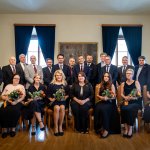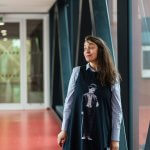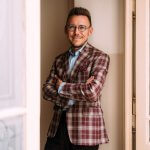Months of waiting, demanding finalization. Researchers describe the path to obtaining an ERC grant
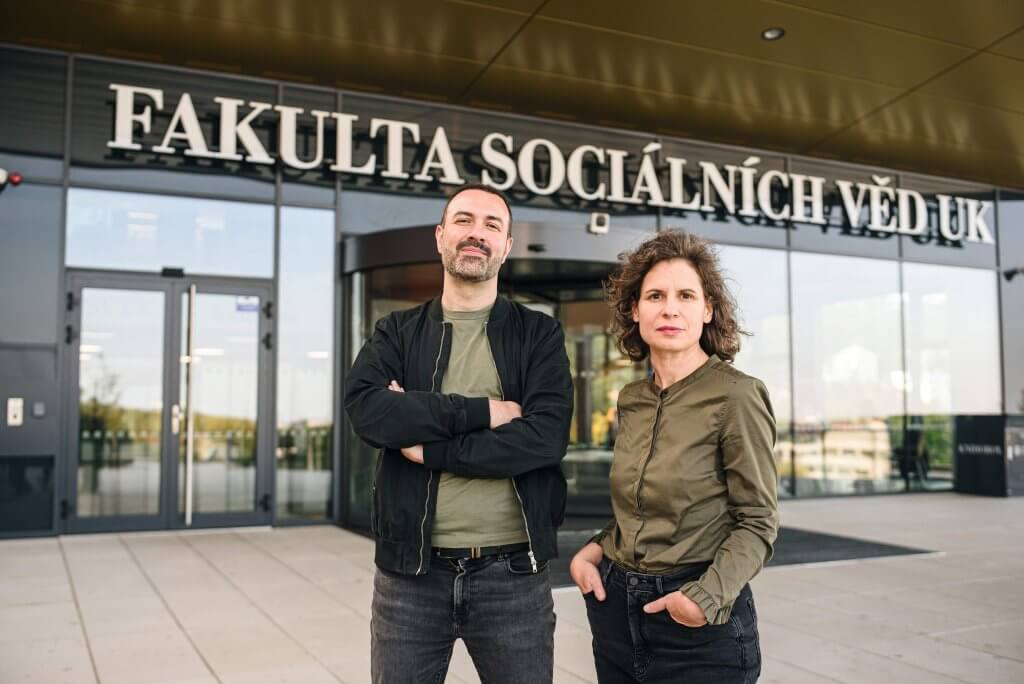
Obtaining a European Research Council (ERC) Starting Grant represents one of the greatest professional achievements that scientists can achieve on a European scale. Recently, two have traveled to the Faculty of Social Sciences, Charles University – namely to Anežka Kuzmičová from the Institute of Communication Studies and Journalism and Michal Smetana from the Institute of International Studies. Both have now received 1.5 million euros for the implementation of a five-year research project. And although their research topics are different, they both went through the demanding process that precedes obtaining a prestigious grant.
Anežka Kuzmičová, who worked at Stockholm University for more than a decade and then at the Faculty of Arts, Charles University until last year, is engaged in research into children’s reading and readership. It will not be any different in her project called Ways of imagining in children’s lives with information texts (WONDRE) – her goal is to investigate children’s relationship to information and reading non-fiction. “Children’s non-fiction is booming right now. I will investigate what such informative reading gives children in terms of experience, how it feeds their imagination and how, according to the children themselves, it differs from other ways of encountering facts,” explains the scientist.
Michal Smetana will investigate the stability of military alliances in his project entitled Microfoundations of Collective Defense (MICROCODE). It will primarily focus on the attitudes of the public in the allied states and their influence on decision-making in the field of collective security. “We are based on the latest findings in the fields of experimental political science, security studies and political psychology. We then use this knowledge to create a new theoretical model that connects changes in social moods in allied states with decision-making at the highest levels of politics,” explains the security expert, whose project will begin in January next year.
Both agree that the topics of the mentioned projects are the result of their already long-term research direction. After all, Smetana also committed to applying for this grant as the principal investigator of the Charles University grant PRIMUS, thanks to which he was able to establish the ELISS (Experimental Lab for International Security Studies) research team. The key inspiration for the empirical focus of the project then became the Russian invasion of Ukraine and the related debates within the North Atlantic Alliance (NATO), when the question of the role of public opinion in the credibility of mutual security guarantees and the functioning of the collective defense system began to be intensively discussed. “What shapes the attitudes of the public in the allied states towards helping the attacked allies and under what circumstances these attitudes are relevant for the political elites are fascinating questions for me, both from the point of view of an academic and a citizen who watches with concern the development of the largest armed conflict on the territory of the European continent since the end of World War II,” he states.
Kuzmičová, previously also the head of a group supported by the PRIMUS program called Integrating Text and Literacy Research (InT&L), started working on the project two months ago. She got the main inspiration for it during previous research focused on fiction, but also during her work abroad, especially during fieldwork in England. More and more often, she alluded to the fact that not enough attention is paid to children who are not mainly interested in fiction, but instead read encyclopedias and other informational texts with great interest. “When society talks about the need for children to read, 99 percent of the time they mean fiction,” notes Kuzmičová. “I gradually began to think about the fact that I would like to look at what non-fiction brings to children. After all, informational texts actually make up the majority of what we read during the day. But a lot of children will tell you that teachers even forbid them to read encyclopedias in the reading journal, because they consider them something inferior,” she adds.

Months of waiting and finalizing
Researchers who apply for an ERC grant always have a long way to go. The entire process from formal submission to signing the grant agreement takes over a year. The first step is the initial formulation of the project proposal, which must be supported by the given institution where the scientist works. “In my case, this process included the input of my institute, faculty and university. This was followed by a several-month process of writing and rewriting the project proposal itself, during which I participated in several practical workshops, round tables and seminars, where I received feedback. I must honestly say that the resulting project proposal was significantly different from the initial proposal,” describes Smetana and adds that he had to spend a lot of time preparing the budget, describing the ethical aspects of the project and creating the narrative CV.
Kuzmičová, on the other hand, wrote an application for an ERC grant after the coronavirus pandemic period. Also because of this, she could not develop ideas for a new project for too long and gradually turn to colleagues for consultation. “Writing the grant immediately preceded the lockdown period, which was very stressful for me due to my managerial position in research with children, in addition to my own parenting. As a result, I was not in the situation in which other ERC applicants are, who sometimes sit on the application for a year and a half continuously. Which, on the other hand, was lucky in my case, because it would have contributed to much more stress from the presentation,” admits Kuzmičová.
After submitting a proposal, researchers wait approximately half a year to find out if they have moved up. If they are successful, they have only a few weeks to prepare for the second round, which consists of an online presentation and an interview. “I didn’t have time to think about advancing. I worked on other grants, which completely absorbed me. I was shocked by the invitation to the interview. So I started preparing, but at that moment we were doing field research, which could not be postponed. On the other hand, it provided me with vivid examples of childhood experience that I could cite during the interview to strengthen my arguments,” recalls the scientist, adding that she considers the interview itself to be fair and pleasant. “I was expecting maybe a little more questions about the composition of the team or the budget, but at the end, almost all the questions dealt exclusively with the theory and methodology of the project, which basically suited me. I was preparing for the interview for about a month – during this period I regularly devoted at least an hour a day to it,” adds Smetana.
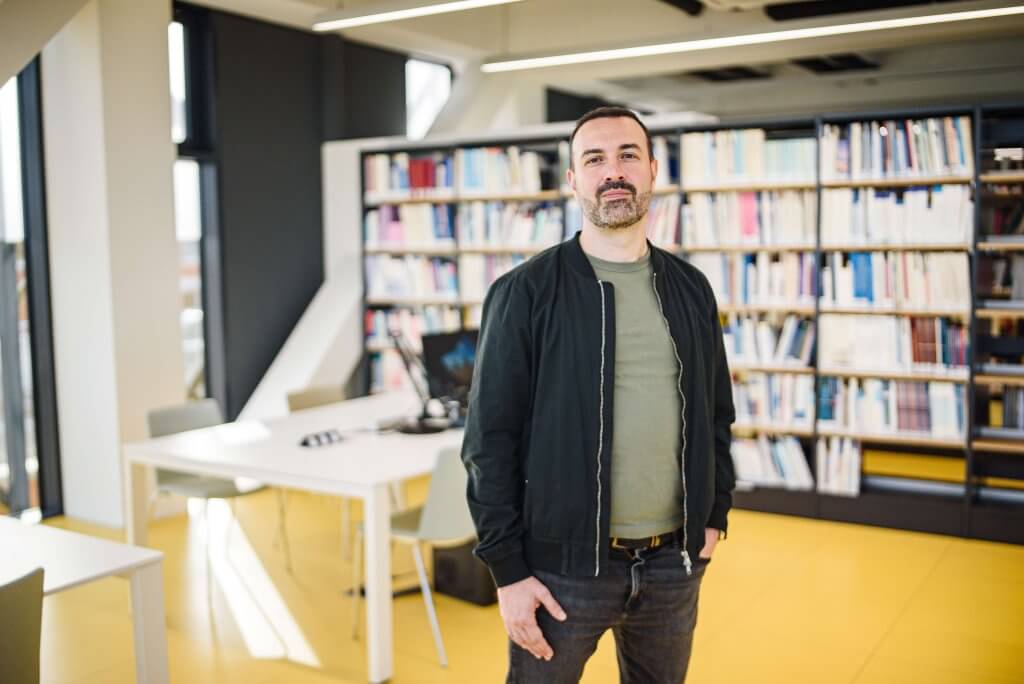
Both equally appreciate the significant help of their colleagues who accompanied them on this journey. At the time of the application for the ERC grant, Kuzmičová was still working at the Faculty of Arts, where she was greatly assisted by the Vice-Dean for Project Management and Grant Activities, Martin Pehal. “He provided me with an external specialist for the technical side of the application, which helped me a lot because it was already beyond my capacity. I needed to come up with a scientific content, and if I hadn’t had this help, my application would never have been completed by the deadline,” she points out. At a more advanced stage, her proposal was also read by Markéta Supa, who also works at the Institute of Communication Studies and Journalism and with whom Kuzmičová has been working closely for a long time. Before submitting the project, her application was also dealt with by the Expert Group for supporting ERC applicants, which was established in January 2021 on the basis of the Joint Declaration of Charles University and the Czech Academy of Sciences. “The group gave me quite strict feedback and I then had to deal with it in the 14 days I had left. But they helped me fine-tune the application a lot,” she says.
Smetana received the most important feedback from his team at ELISS – namely from Ondřej Rosendorf and his English colleague Lauren Sukin. “But a number of other colleagues within my PRCP center helped me a lot, such as Michal Parízek, Michal Onderčo, Petr Janský, Dagmar Vorlíček, Tomáš Weiss, Jan Hornát, Vojtěch Bahenský and many others,” says Smetana. “I was greatly helped by the support of Eva Horníčková and Pavlína Hillerová from the Science Department at FSV UK, Veronika Syrovátková and Adéla Jiroudková from the UK Rectorate and the entire management, project team and secretariat of the Institute of International Studies, where we have excellent conditions and human resources for the preparation of similar projects. Without this fantastic support that I receive at our institute, the path to the ERC would have been much more challenging,” he emphasizes.
Innovative methodology
With its grants, the European Research Council awards innovative projects with so-called “out of the box” thinking, which are supposed to go beyond the boundaries of knowledge in the given field and lead to breakthrough discoveries in the given scientific field, on a long-term and global scale. In this regard, Kuzmičová and Smetana particularly mention their innovative methodologies of their projects.
In the WONDRE project, the children themselves will be the central authority. “There is a lot of research in which children are observed and evaluated from the outside. However, such research often only reproduces adults’ ideas about children, they do not convey the authentic experience of children. Because I follow a child-oriented path, I sometimes encounter prejudices from reviewers in the sense that my data cannot be reliable. But support from the ERC proves that science is democratizing,” Kuzmičová points out. “My project is based on the idea that if you want to find out how children experience different things, you have to put them in the role of an expert on their own lives. After that, it’s just a matter of coming up with a sufficiently sensitive way to conduct such research and what tools to have for it,” she adds.
Among other things, she wants to map the diversity among children and to find out what type of informational texts work for different children’s readers. “Children are very often treated in society as if they were a homogeneous population, but we adults were also children and we are not a homogeneous population either,” explains the researcher, who won the Neuron Prize for promising scientists in 2022. “One of the goals of education should be education in reading. We want to have a society of people who will be critical, thoughtful, engaged and active. And informational texts lead them to exactly this,” she says.

In connection with his chosen research strategy, Smetana emphasizes that it was not practically feasible before – only the rapid development of artificial intelligence became an impulse for him to try to use new technological tools. “To a large extent, the effort to use artificial intelligence tools to design immersive, interactive and convincing multimedia experiments, where respondents perceive the emotional impact of a given situation much more strongly and thus react more realistically than was the case with classic text experiments, is groundbreaking here,” he explains.
His project should bring a deeper understanding of what factors influence public opinion in the field of collective defense and how this public opinion influences decision-making at the highest level in the alliance states. “In addition to classic professional articles in academic journals, we also plan to publish shorter texts aimed at public institutions, policymakers and the wider public. We are currently working on a website, which should also include an interactive map and data on public opinion within NATO states,” he outlines the results of the project.
However, both are now looking forward to the new challenge that awaits them in the next five years and praise the freedom they get from the European Research Council. According to Smetana, other grant agencies, which often do not provide such freedom, could also be inspired by that. “In fact, they sometimes make it impossible to come up with truly breakthrough results. On the contrary, they often transfer a huge administrative burden to researchers, which ultimately makes it impossible to devote themselves fully to research work,” notes Smetana.
“I don’t have to be afraid to do something slightly different from what I have in this project. I don’t have to be afraid to try something, find out it doesn’t work, and start over. In this regard, I feel freedom, but due to the size of the project, also a huge commitment,” says Kuzmičová. “I am gradually coming to terms with the fact that I will have much less opportunity to get my hands dirty with the research myself, because I will have to supervise that the individual parts of the project hold together,” concludes the scientist.
